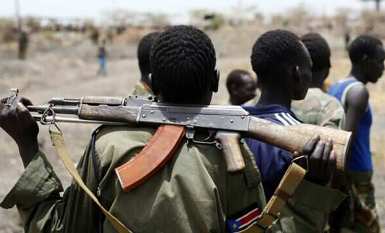S. Sudan army denies involvement in attack on military training facility in Mapel
April 29, 2014 (JUBA) – The South Sudanese army (SPLA) has blamed war widows for attacking military trainees in Western Bahr el Ghazal state’s Mapel town last week, in an incident it says led to the death of five people.

Speaking to Sudan Tribune on Monday, SPLA spokesperson Colonel Philip Aguer said the “unfortunate incident in Mapel” was used as scapegoat by three brigadier generals to defect.
He says Brig Gen. James Ochan Puot, the former head of the military training centre who had been known to have links with Machar and lead rebel negotiator and former Unity state governor Taban Deng Gai, was among three officers to defect.
These claims have, however, been rejected by the rebel movement.
The government initially said the incident at Mapel, east of Wau, was the result of an internal rebellion.
However, Aguer now says that 280 trainees, most of whom were unarmed, fled after authorities struggled to contain a mob of women who lost their husbands during the recent crisis, was not immediately contented by authorities.
“The widows whose husbands were killed in Jonglei, Upper Nile and Unity states wrongly blame trainees from [the] Nuer tribe as being responsible and this is very unfortunate,” said Aguer. “These brigadiers in Wau exploited the situation to join the rebellion,” he added.
Aguer did not provide further details on how the five trainees died.
There remains conflicting accounts of what occurred at the military facility and Sudan Tribune has been unable to independently verify the number of casualties.
However, it has been alleged that 192 unarmed trainees from Machar’s Nuer tribe were massacred at the site by government troops loyal to president Salva Kiir.
In an exclusive interview with Sudan Tribune on Sunday, Brigadier General Gatwick Gash Makah, who was among the officers to switch allegiance, described the incident as ethnically motivated mass murder.
Makah said he and another five brigadier generals, including Pout, had defected with a sizable number of troops and are in the proximity of Wau town.
He claims the incident at Mapel was triggered after attackers beat to death an unarmed Nuer soldier at a market close to the military centre before opening fire indiscriminately on Nuer trainees.
Generals who defected said government forces had advanced on Wau on Saturday, attacking local residents, sparking a mass defection of Nuer officers.
However, credible military contacts in Wau and Mapel say Nuer officers became nervous and attempted to enter the UN base in Wau but were denied entry, forcing them to flee into the bush.
Military sources told Sudan Tribune that some of the returning officers have now been allowed to seek protection at the UN base.
In comments to Sudan Tribune on Monday, Gordon Buay, a spokesperson for South Sudanese rebels now allied with Kiir, said the army’s former chief of staff, James Hoth Mai, and Nuer ministers had intervened to restore calm.
He said Nuer officers had been provided with assurances that the incident in Mapel was caused by local people whose relatives were killed on the frontline.
“A Nuer general was sent to Mapel to return the situation to normal. Those who left Wau in fear are now returning to the town,” he said.
“We contained the situation in Wau. The local people who caused the problem in Mapel will be brought to justice. Some will be removed from the area all together,” said Buay.
Major Simon Mangok, who headed the gubernatorial guard, was among five officers to return on Monday, several sources at the UN Mission in South Sudan (UNMISS) confirmed.
Sudan Tribune understands the general command has issued orders to the local command not to launch attacks on returning soldiers and officers.
(ST)
